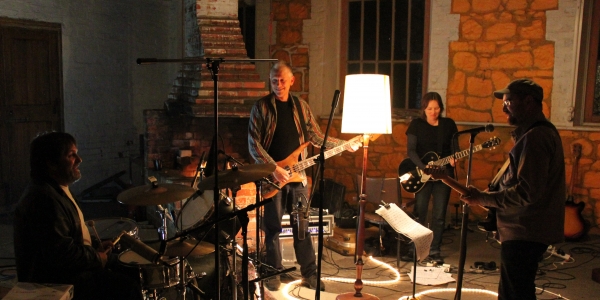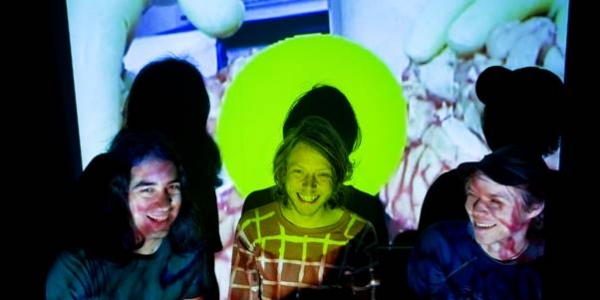Why is this important? At the time, Dunedin had only two TV channels and three radio stations, all inwardly focused and completely indifferent to international events unless theyconcerned a Royal visit or what sort of coin the local farmers could expect to fetch for a bale of wool on the commodities exchange. The country was in the middle of the long, tedious Prime Ministership of Robert Muldoon, whose antagonistic attitude to any other nation besides his own was best summed up when he claimed that New Zealanders who emigrated to Australia raised the IQ of both countries.
Suffice it to say, if one were to start circulating, say, a copy of Never Mind the Bollocks or Unknown Pleasures in such a vacuum-sealed environment, the city’s more discerning youth would have a collective fit. And so it was, kindled by a visceral reaction against South Islandisolation, stoked by an aural crash course in punk’s “just pick up a fucking instrument and play” ethos, that the Dunedin Sound was born.
Documented by Christchurch’s Flying Nun Records, championed by the local uni’s Radio Otago, and later name dropped by genre Gods from Stephen Malkmus to Chan Marshall, this tiny little blip of a town in the most remote part of the Pacificwound up producing some of the world’s best post-punk and indie-pop bands.
The Bats are the most prolific, and in my humble opinion, the best band to emerge from this diverse cabal, still going strong on the eve of their 30 th anniversary and gearing up for an international tour of their eighth studio album, Free All The Monsters. In contrast to the frenzied workload of the band’s earlier career, when they put something out every year between ’84 and ’93, Monsters is evidence of the measured approach The Bats have been taking since 2005’s At The National Grid.
“We recorded Monsters in December last year, in an out of the way place north of where I live,” says front man and guitarist Robert Scott from his home in Dunedin. An ex-mental asylum, actually! It was an impressive place, surrounded by trees and lovely birds and all that stuff. We had our gear set up in the old stables out the back, surrounded by horses. It was a very lovely place to record and we were all keen to work.I’d written about six tunes for the band to tackle and we sort of worked it up from there. By the end, I wrote two more, Kaye [Woodward] and Paul [Kean] wrote a few others.
“I think before, we’d recorded albums after having locked in most of the material live,” Scott says.”And then with the last few albums, we haven’t been playing as much, and I’d been playing more on my own a lot more. I suppose we’d all gone off on a bit of a tangent. Sometimes it’s hard to know what direction you’ll head off in when you start writing, and I think with all the time apart between us, it was harder to know what would come out the other end. You kind of find out in the process what other people in the band will make of it.
“There’s continuity in terms of the way we play, it’s still pretty recognisably us. The song writing for those albums has been largely the same as always. At the same time I kind of feel like I’ve developed my song writing after doing my solo album last year.”
Despite The Bats being much more subdued in their output, at the moment Scott is possibly more musically active than ever. In between Monsters and 2008’s The Guilty Office, Scott has recorded and toured his second solo album, Ends Run Together, and played bass in a long-overdue tour with his long-time collaborators in fellow Flying Nun alumni The Clean, including an unforgettable performance at the 2011 Golden Plains.
“It’s kind of like the more you work, the more you strive to achieve,” says Scott.”For me and music, there’s always been a tortured relationship.There was a quiet period of sitting at home and not giving two shits about it. I think the other members of The Clean work in a different way to how I work now – they have their quiet periods where nothing’s going on, without agonising over it. They’re up in Christchurch and I’m five hours down south,so they’ve always been working onthe one thing together, and sometimes nothing. To tour with them again was great: Mistletone were instrumental in setting up Golden Plains and to play that kind of show in Australia again was really good for us.”
After 30 years onstage, having just released one of their best albums yet, it must be asked: what sort of crowd does one of the most influential bands in New Zealand pull these days?
“We’re still getting a mixture of people,” Scott says. “There are still a lot of people who have been seeing us for a long time, but the audience has changed quite a bit and we’re getting quite a lot of young people who are into live music. In Dunedin, we get everyone from the local butcher to students from Otago.
“I’d like to think wherever we play, we’re definitely attracting some new people to the audience. Peoplewho,like us, are keen for nothing more than to hook up and share music with each other. I mean, I’d hope we’re still appealing to a new generation, because if we’re still playing to people of our age then we’d have half the audience in wheelchairs!”







